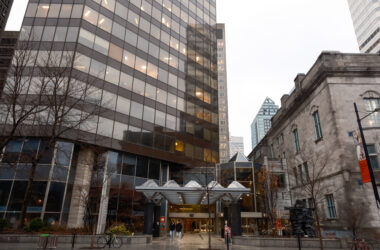In an email sent on Nov. 4, McGill’s Associate Provost (Teaching & Academic Programs) Christopher Buddle and Deputy Provost (Student Life & Learning) Fabrice Lebeau announced plans to increase in-person teaching activities for the Winter 2021 semester. As stated in September, remote learning will still remain the primary delivery method for courses.
McGill’s administration outlined the two tiers of academic activities for Winter 2021. The first tier, for which in-person attendance will be mandatory, includes courses and learning activities that are difficult to deliver remotely, such as critical laboratories, clinical activities, and project courses. Second-tier classes will provide students with the option to be on campus or use remote alternatives, and include seminar courses, tutorials, conferences, laboratories, and some lectures.
Prior to the Nov. 4 announcement, McGill emailed department chairs and professors on Oct. 30 explaining their plans. Those internal emails requested that department chairs compile a list of courses that can potentially be taught in person.
These plans to hold some in-person classes have received backlash from members of the McGill community. At a Town Hall on Oct. 30, members of McGill’s Biology Graduate Students’ Association discussed various concerns about the safety and feasibility of the transition to in-person learning. In an interview with The McGill Tribune, Travis Chen, a chief delegate for the Association of Graduate Students Employed at McGill (AGSEM), explained how many teaching assistants (TA) were caught off guard by McGill’s announcement.
“The safety of TAs is a main concern,” Chen said. “The ventilation [of classrooms] would not be up to standard […], McGill is not requiring students to wear masks, [and] TAs and professors are not allowed to enforce masks [usage] themselves [….] McGill’s plans do not line up with the scientific consensus on how to limit [the spread of COVID-19].”
Beyond safety concerns, Chen is concerned that in-person teaching will place additional strain and extra work hours on TAs.
“There is no other way to look at this, [as] it is going to hurt the quality of teaching,” Chen said. “[TAs] will be more stressed, they will have more work to do, and they’re not going to be paid more even though they’re working more hours and working harder.”
Shannon Dunphy, president of the Biology Graduate Student Association (BGSA), said that the McGill administration has been unresponsive to the BGSA’s complaints. Dunphy is concerned that the university’s plans might create an unlevel playing field for students.
“I imagine students will feel pressured [to attend the on-campus activities],” Dunphy said. “McGill will essentially be creating two ‘tiers’ or ‘classes’ of students, but with both groups expected to perform at the same calibre.”
In an email to the Tribune, Provost and Vice-Principal Christopher Manfredi stated that student feedback helped inform the decision to provide the option for in-person classes.
“We have heard from students that they are seeking connection to McGill,” Manfredi wrote. “[Many] instructors and administrative and support staff are also missing opportunities to connect with students in person.”
On Oct. 30, the same day the email went out, La Presse published an article signed by Suzanne Fortier, Principal and Vice-Chancellor of McGill, and seven other university administrators across Montreal. In it, they explained how Montreal’s revival is dependent on the thousands of students, both domestic and international, who attend the city’s universities.
Chen recognizes that many TAs and students may enjoy in-person teaching more than online delivery, but does not believe that it was the main reason McGill has made its new plans. Chen believes a probable drop in enrollment is at the root of the issue.
“The student survey said that students missed in-class teaching, but that ignores the idea that students [might not] want to go to class during a pandemic, [and that] they just miss the in-class aspect,” Chen said. “They’re worried about funding and their source of income. The implication at the town hall is that this must be done to keep the undergraduate experience.”
For more information on online and in person courses, visit McGill’s FAQ page for the Winter 2021 semester.










